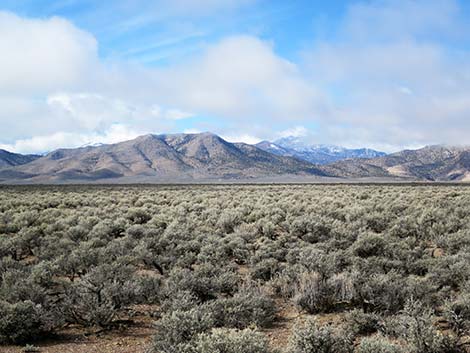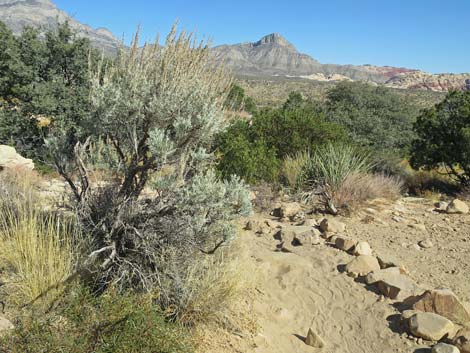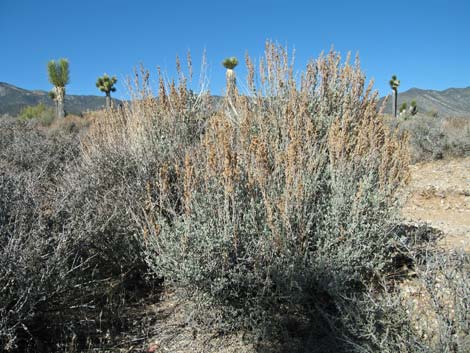
Shrubs Around Las Vegas, Vegetation Around Las Vegas
 |
General: Sagebrush (Artemisia spp.) is a stout, dense, upright shrub with blue-gray leaves and 3- to 6-inch tall flower stalks that stand up above the foliage. The flower stalks persist long after the flowers are gone. The aromatic leaves are narrow and wedge-shaped with notches in the blunt tip, and usually densely hairy. Evergreen. Individually, the flowers are small, but together they form several blue spikes of color above the plant during spring. There are about 300 species in the genus Artemisia, but fortunately, only 21-31 species, depending on how you count, occur in Nevada. Sagebrush usually is an uncommon component of higher elevation slopes in the mountains around Las Vegas, but it the dominant species north of Las Vegas, covering thousands of square miles of mountains and valleys in the Great Basin Desert. Around Las Vegas, sagebrush occurs in higher-elevations canyons, bajadas, and mountain slopes from the Upper Sonoran (Mojave Desert Scrub and Pinyon-Juniper Woodland), Transition (Yellow Pine Forest), Canadian (Pine-Fir Forest), and Hudsonian (Bristlecone Forest) life zones. In some places in the Spring Mountains, sagebrush forms prairies where trees are absent. |
 |
Family: Sunflower (Asteraceae). Other names: Plant Form: dense, upright shrub. Height: 6 inches to 6 feet, depending on species; usually 1-3 feet around Las Vegas. Bark: gray-brown, shaggy. Stems: stout and woody; grows from a woody base. |
 Flower stalks during winter. |
Leaves: Blue-gray, wedge-shaped to about 1-inch long by 1/4 inch wide), usually two notches in the blunt tip, aromatic, usually densely hairy. Flowers: Tiny, blue flowers on a branching spike (panicle). Individual flowers are obscure, but the mass appears blue. Seeds: Tiny (< 2 mm), oblong. Habitat: Around Las Vegas, dry, well-drained sandy, gravelly, and rocky soils on upper bajadas, ridges, canyon, and mountain slopes. Elevation: 4,500 to 10,000 feet. Distribution: Various species occur throughout the northern hemisphere. Comments: |
Note: All distances, elevations, and other facts are approximate. Names generally follow the USDA database.
![]() ; Last updated 220111
; Last updated 220111
| All Shrubs | Plant Species Index | Glossary | Copyright, Conditions, Disclaimer | Home |